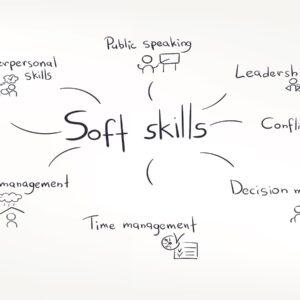
The importance of soft skills training in the curriculum can be attributed to a number of factors. Even though academic knowledge is unquestionably crucial for students’ personal and professional development, soft skills are as significant. Here are some justifications for why soft skill development should be included in the curriculum
Employability:
Employers in a wide range of industries place a high emphasis on soft skills. The ability to communicate effectively with others gives pupils an advantage in today’s competitive employment environment. Candidates with good leadership, problem-solving, teamwork, and communication skills are frequently given preference by employers. Educational institutions can improve their students’ employability chances and better prepare them for the workforce by including soft skills training into the curriculum.
Career Success :
Soft skills are crucial for both finding work and advancing in your career. People with strong soft skills are better equipped to lead teams, manage projects, interact with clients, and adjust to shifting work situations. These abilities help people succeed professionally and excel in their chosen fields of work
Effective communication:
It’s crucial to have good communication skills in all element of life. Students that have strong communication skills are better able to listen intently, communicate their ideas accurately, and comprehend others. Collaboration, teamwork, and stronger relationships are all made possible by effective communication. Students can learn how to express their views clearly, participate actively in conversations, and form deep connections by placing an emphasis on communication skills in the curriculum.
Collaboration and teamwork are essential in today’s workplace. Training in soft skills allows students to collaborate, value differing viewpoints, and make valuable contributions to team efforts. Collaboration and collaboration abilities help students achieve common goals, settle problems, and develop mutual respect—skills that are essential in professional contexts.
Critical Thinking and Problem-Solving:
Training in soft skills fosters these cognitive processes. Students may analyse complex problems using these talents, find original solutions, and arrive at wise judgments. Critical thinking and problem-solving abilities are useful in a variety of fields because they help people overcome obstacles, adjust to changing circumstances, and innovate.
Leadership and initiative
Training in soft skills helps students develop their leadership abilities and enhances their sense of initiative. They gain the capacity to inspire others, offer direction, and accept accountability for their deeds. Students with strong leadership abilities can make a difference in their neighbourhoods, workplaces, and personal lives.
Emotional Intelligence
Soft skills training places a strong emphasis on developing emotional intelligence, which entails being able to recognize, comprehend, and control one’s own emotions as well as empathize with others. Students with emotional intelligence may successfully navigate social situations, form wholesome relationships, and resolve problems. Additionally, it helps with self-awareness and overall well-being.
Adaptability and resilience are developed through soft skills training, which are crucial in today’s environment of rapid change. Students gain the ability to adopt new technologies, change with the times, and recover from failure.
Social Skills and Networking:
Training in soft skills aids students in creating strong social networks. For professional development and career advancement, networking is crucial. Students can make worthwhile connections and be successful in creating meaningful professional relationships by being encouraged to develop social skills like active listening, empathy, and relationship-building.
Life Skills:
The inclusion of soft skills instruction in the curriculum equips students with the interpersonal, communication, problem-solving, and flexibility abilities required for success in both professional and personal realms




